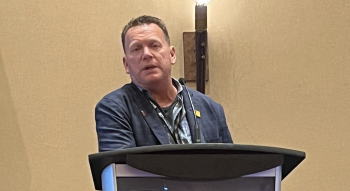Image Caption
Local Journalism Initiative Reporter
Windspeaker.com
Having worked as a First Nations advisor for the past 30 years, Michael Jacobs has garnered his share of experiences.
And Jacobs, a member of Curve Lake First Nation in Ontario, does not mind doling out some valuable advice from the wealth of knowledge he has acquired over the years.
For example, Jacobs was a guest presenter at TechNations 2024. The event, annually hosted by the Ontario First Nations Technical Services Corporation, was held Aug. 21-22, at the Casino Rama Resort, located on the Chippewas of Rama First Nation.
Jacobs is the CEO for Cambium Indigenous Professional Services (CIPS) Inc., a leading Indigenous consultancy firm in Canada.
Jacobs’ presentation at TechNations 2024 was titled Indigenous Inclusion and Benefit Plans for Community Housing and Infrastructure Projects.
“I’ve been doing this for a while,” Jacobs said of his advisory work. “I’ve really enjoyed doing the work. But I’ve seen a lot of projects come and go.”
During the course of his career, Jacobs said he has witnessed a strive for economic reconciliation, in part because of the country’s truth and reconciliation mandate as well as the United Nations Declaration on the Rights of Indigenous Peoples.
“We’ve started to see economic reconciliation happen which means people are interested,” Jacobs said. “They’re interested, if nothing else, in understanding how they can be an economic driver when they do large infrastructure projects, how they can contribute to the social fabric.”
Jacobs said economic reconciliation does occur when there is Indigenous inclusion in projects, including those in housing and infrastructure industries.
“We’re starting to realize that Indigenous inclusion is better, that it’s the best outcome,” he said. “We’re part of the process, part of the construction, part of the design, part of the evaluations, part of the environmental evaluations, part of the construction testing and inspection. The outcomes for our communities are much better.”
Though they are included in various projects, Jacobs said Indigenous representatives can be doing much more for their communities. He believes it is a vital goal to get as much financial benefits as possible for Indigenous communities for projects on their lands.
Jacobs would also love to see an increasing amount of jobs for certain projects going to Indigenous members.
“What’s happening is that we’re starting to realize that internally,” Jacobs said. “Before we were outsourcing all of that. What we want to do now is focus on how that money can stay in our communities and how we can drive that as a practitioner, as a project champion.”
Jacobs said it is also wise for leaders from Indigenous communities to choose which projects they will be involved with. He believes it is prudent that every project that is undertaken should be done so with a solid idea of bringing much needed funds into the community.
“If we’re not thinking about our projects for economic prosperity as we do them, we miss the opportunity and we invest $400 million in a solar farm or something like that,” he said. “And there’s nothing to show for that $400 million spend, except for that solar farm when we could leave extra money behind in these projects.”
Jacobs believes additional ways have to be sought for even more Indigenous inclusion in projects.
“How are we going to include ourselves in these projects as we go forward,” Jacobs said.
“And I’m starting to say why aren’t we demanding more inclusion? So, as you’re doing some sort of procurement for a project why are we not demanding that some of that money comes back to us in ways that make sense.”
Ideas that Jacobs offered included employment training for Indigenous members or the sponsoring of a local sports team.
“People want to do business with us now and when they’re doing business with us, there’s a way to do it,” Jacobs said.
Jacobs added it is acceptable to demand a social piece as part of every project with a partner or to ask for a return on cash.
“Every dollar we invest we want to get some sort of return on it and how are we going to get that return,” he said.

